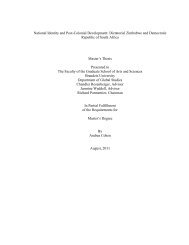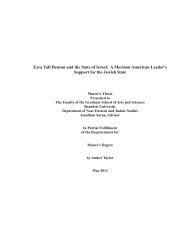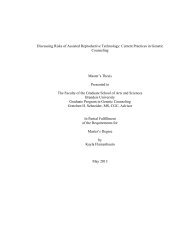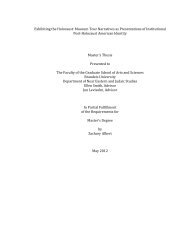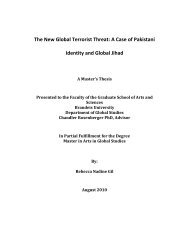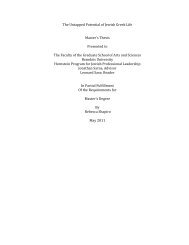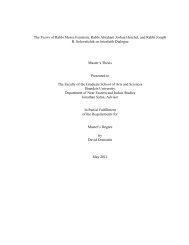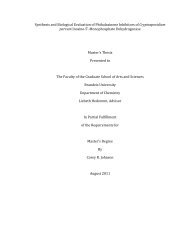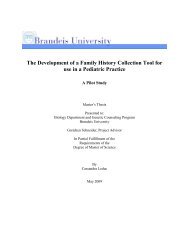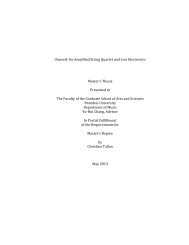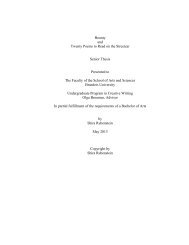A Familiar Frontier: The Kennedy Administration in the Congo ...
A Familiar Frontier: The Kennedy Administration in the Congo ...
A Familiar Frontier: The Kennedy Administration in the Congo ...
Create successful ePaper yourself
Turn your PDF publications into a flip-book with our unique Google optimized e-Paper software.
assessment is valid, but it had little relevance to <strong>the</strong> new situation <strong>in</strong> <strong>the</strong> <strong>Congo</strong> anddemonstrated a dangerous way of th<strong>in</strong>k<strong>in</strong>g about neutralism, which closely resembledSecretary of State John Foster Dulles’ previous judgment, <strong>in</strong> 1956, that neutralism <strong>in</strong> <strong>the</strong>develop<strong>in</strong>g world was “a transitional stage to communism.” 4In <strong>the</strong>ir aforementioned report, dated December 30, 1960, <strong>the</strong> members of <strong>the</strong>Task Force concluded that “<strong>the</strong> Soviet Union is ready to give unilateral assistance (quiteapart from <strong>the</strong> UN) to any regime friendly to its advances. It is probably giv<strong>in</strong>gsubstantial aid to <strong>the</strong> pro-Lumumba government <strong>in</strong> Stanleyville.” 5 However, Sovietsources reveal that Khrushchev refused to provide aid to Gizenga after Lumumba’simprisonment despite frantic requests for “direct Soviet <strong>in</strong>terference.” On December 14,1960, only days after sett<strong>in</strong>g up his government <strong>in</strong> Stanleyville, Gizenga asked <strong>the</strong>Soviets “immediately, without delay, to help us <strong>in</strong> military equipment and foodstuffs,” as“Stanleyville Prov<strong>in</strong>ce is <strong>in</strong> serious danger.” 6 Not receiv<strong>in</strong>g a satisfactory response, asubsequent telegram called out <strong>the</strong> Russians for <strong>the</strong>ir “passivity” and asked “Why can <strong>the</strong>USSR not help <strong>the</strong> legitimate and democratic government that enjoys <strong>the</strong> support of <strong>the</strong><strong>Congo</strong>lese?” 7 One can understand why <strong>the</strong> Task Force would have expected cont<strong>in</strong>uedSoviet <strong>in</strong>volvement, s<strong>in</strong>ce <strong>the</strong>y did not have access to <strong>the</strong>se reveal<strong>in</strong>g exchanges, but <strong>in</strong>overestimat<strong>in</strong>g <strong>the</strong> danger of communist takeover, <strong>the</strong>y were just cont<strong>in</strong>u<strong>in</strong>g <strong>the</strong> mistakesof <strong>the</strong> previous <strong>Adm<strong>in</strong>istration</strong>.<strong>The</strong> first months of 1961 also saw <strong>the</strong> United States cont<strong>in</strong>ue its policy of timidlyexpress<strong>in</strong>g dissatisfaction with Belgium for keep<strong>in</strong>g so many of its advisers <strong>in</strong> Katanga.4 Qtd. <strong>in</strong> Thomas J. Noer, “New <strong>Frontier</strong>s and Old Priorities <strong>in</strong> Africa,” <strong>in</strong> <strong>Kennedy</strong>’s Quest for Victory:American Foreign Policy, 1961-1963 (New York: Oxford University Press, 1989), 2555 Report of Task Force on Africa, Pre-Presidential Files, Box 1073, Folder 26 Qtd. <strong>in</strong> Mazov, A Distant Front <strong>in</strong> <strong>the</strong> Cold War, 1277 Qtd. <strong>in</strong> Mazov, A Distant Front <strong>in</strong> <strong>the</strong> Cold War, 12943





